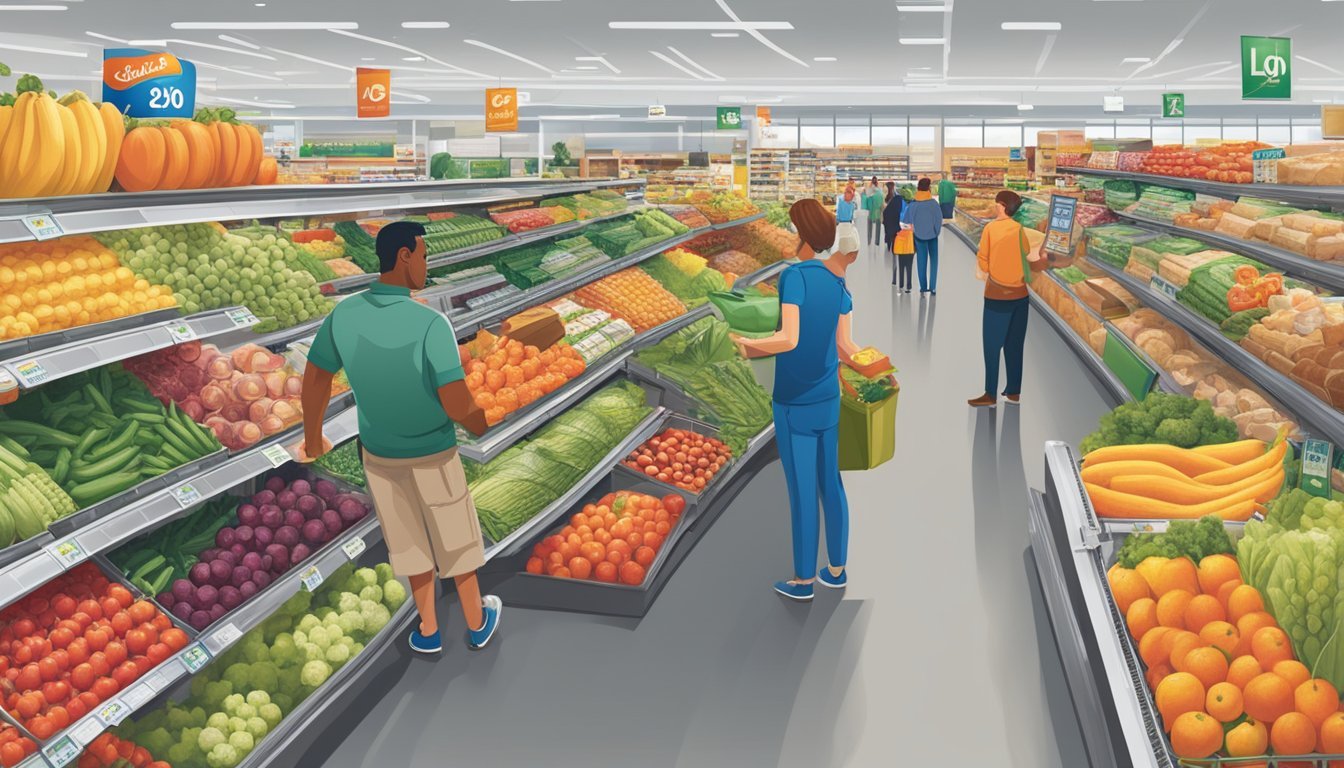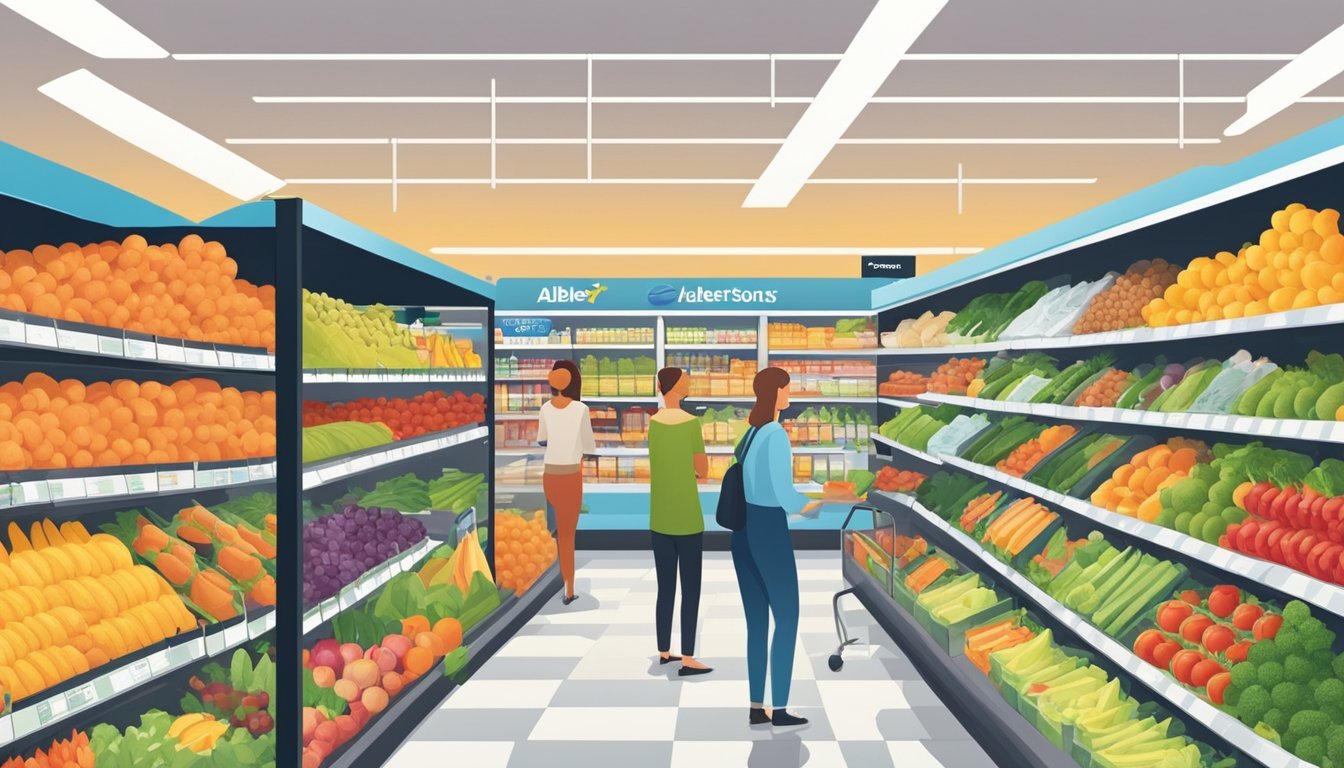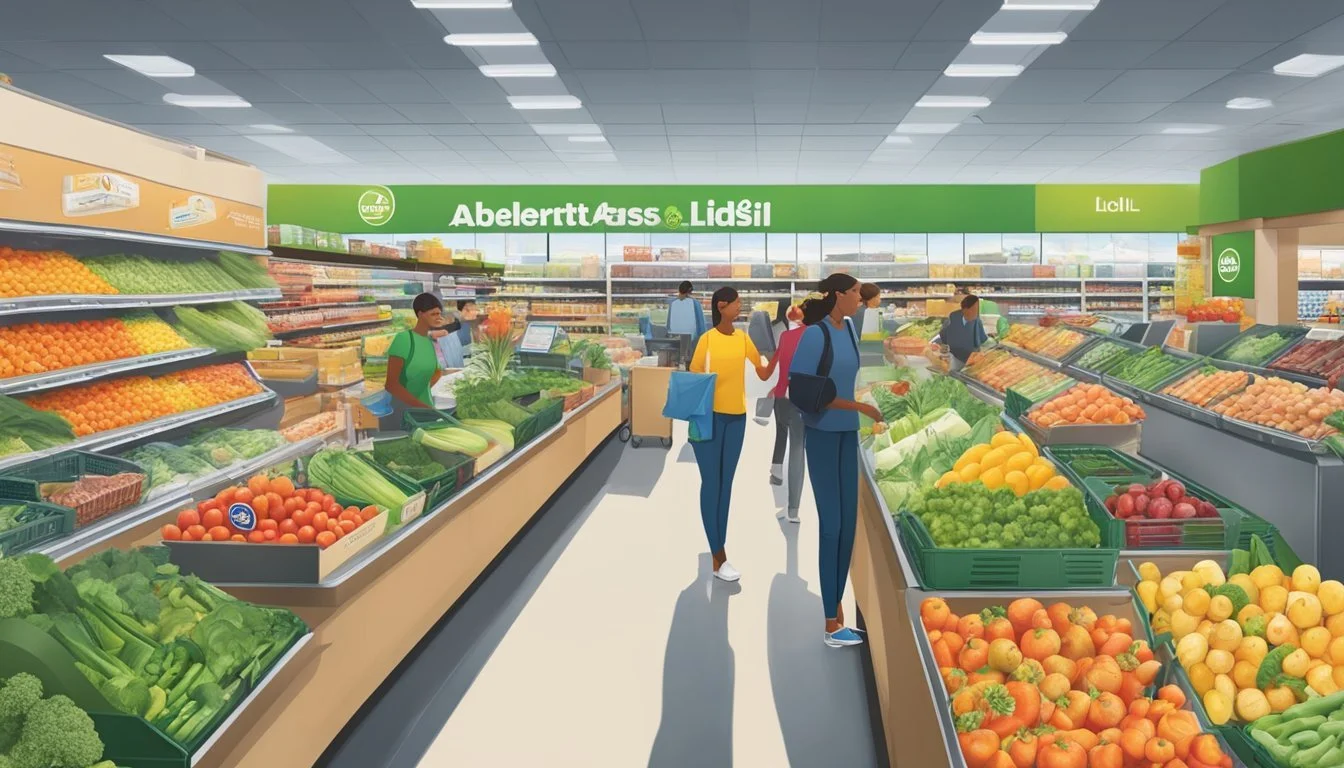Albertsons vs Lidl
Comparing Shopping Experience, Prices, and Quality
Part of Our Grocery Store Guide with Details on Albertsons and Lidl
In the competitive world of grocery retail, Albertsons and Lidl present two very different shopping experiences. Albertsons, an established player with a solid presence in the American market, offers consumers a familiar supermarket format that includes a variety of brand-name and private-label products. With a reputation for providing a consistent shopping experience, Albertsons has become a staple for many shoppers in the regions it serves.
On the other hand, Lidl, a relative newcomer to the U.S. from Germany, brings a European flair to the grocery scene. Lidl is renowned for its low prices and a rotating selection of non-grocery items, appealing to budget-conscious consumers and those intrigued by its novel approach to product curation. With a significantly larger footprint globally, Lidl's expansion into the American market poses new considerations for consumers accustomed to traditional supermarket models.
When deciding between Albertsons and Lidl, consumers weigh factors such as pricing, product quality, store organization, and the overall shopping experience. Albertsons may offer a more conventional supermarket experience with a broader array of products, whereas Lidl's focus revolves around efficiency and deeply discounted prices. Each store's approach has the potential to align with different customer preferences, setting the stage for a nuanced comparison of their respective offerings and retail models.
History and Background
In understanding the dynamics of Albertsons and Lidl, history plays a fundamental role. Each chain has its unique inception story, marked by distinct expansion strategies.
Albertsons' Origins and Expansion
Albertsons began its journey in 1939. Its founder, Joe Albertson, opened the first store in Boise, Idaho. That initial store was remarkably spacious for its time, measuring 10,000 square feet, nearly eight times larger than its contemporaries. It boasted innovations such as free on-site parking and a money-back guarantee policy. Despite financial constraints—Joe Albertson's starting capital was a modest $5,000—the grocer thrived. Over the decades, Albertsons expanded significantly, becoming a key player in the North American market with over 2,250 stores reported as of 2020.
Lidl's European Roots and Entry into the U.S. Market
Originally from Germany, Lidl is a prominent European grocery chain with a strong international footprint. It has been a crucial competitor since its inception in the 1970s. Lidl's approach includes offering quality goods at low prices, a strategy that has resonated well with consumers. The company entered the U.S. market with an aggressive expansion strategy. By mid-2023, Lidl operated around 170 stores in the United States and even opened a location in Manhattan. The expansion is indicative of how this European counterpart has successfully transplanted its business model to compete in the American retail landscape.
Store Brands and Product Selection
When comparing Albertsons and Lidl, one cannot overlook the diversity and uniqueness of their store brands and product selections. Each grocery store chain offers exclusive brands that cater to a variety of tastes and preferences, from organic options to premium selections.
Exclusive Brands at Albertsons
Albertsons boasts a wide array of exclusive brands that cater to different market segments. Among these, Signature Select stands out as their premier brand, encompassing a vast selection of items, from frozen pizzas to condiments. Their O Organics line presents customers with a variety of organic options, including produce and pantry staples. For meat lovers, Albertsons offers Waterfront BISTRO, a selection of high-quality seafood, and Open Nature, which features meats free from antibiotics. Moreover, their bakery department frequently showcases a range of freshly baked goods appealing to those who favor artisan-style breads and pastries.
Lidl's Simply Nature and Other Unique Offerings
Lidl has made its mark with its Simply Nature brand, boasting products that are often organic and free from artificial ingredients. This range includes an attractive selection of produce, meeting the needs of those who prioritize natural food choices. Alongside this, their Preferred Selection brand is known for providing premium and specialty items, giving shoppers access to gourmet selections at competitive prices. Lidl is also appreciated for its assortment of meats, which are typically offered in diverse cuts and varieties. Regarding baked goods, Lidl's in-store bakeries provide customers with an array of fresh, high-quality options daily. The groceries available at Lidl are generally well-regarded for quality and affordability, even though the selection may sometimes feel more limited when compared to larger chains.
Price Comparison and Affordability
When comparing the pricing strategies of Albertsons and Lidl, it becomes evident that consumers' choice between these two may be significantly influenced by their budget and shopping preferences. Albertsons operates with a varied pricing strategy, while Lidl, a discount grocer, anchors its reputation on consistently low prices.
Albertsons' Pricing Strategy
Albertsons tends to cater to a wide customer base with promotional deals and loyalty discounts. However, their regular prices may be higher than discount grocers. They host sales events and provide coupons which savvy shoppers can use to their advantage. Albertsons' pricing may not be the most affordable option for those on a strict budget, but they often feature a diverse range of products.
Regular Prices: Generally higher except for sales and promotion periods
Discounts: Available to loyalty program members and through various promotions
Product Range: Wide variety of brands and products, including premium options
Lidl's Low Price Model
Lidl takes pride in its low price model, regularly undercutting competitors on many staple items. As a budget-friendly option, Lidl is appealing to cost-conscious consumers who prioritize savings over brand loyalty. They achieve these low prices through a limited selection of private labels and a no-frills store layout.
Regular Prices: Consistently low across most product categories
Discounts: Not as prevalent, due to already low baseline prices
Product Range: Focused selection with a high ratio of store-branded products
By maintaining a streamlined inventory and efficient operations, Lidl is able to offer prices that are often lower than Albertsons', particularly for shoppers with a tight budget.
Quality of Goods and Freshness
When it comes to grocery shopping, consumers often prioritize the quality of goods and the freshness, especially regarding perishable items such as meat, vegetables, and bakery products.
Quality Assessments at Albertsons
Albertsons has built a reputation for offering a wide variety of meat and chicken, ensuring that customers have access to cuts that range from standard to premium. Their focus on providing quality cheeses and bread is evident, with store-brand products often competing closely with national brands in terms of taste and quality. Albertsons reportedly performs regular quality assessments to maintain their standard for good quality groceries across their stores.
Freshness and Organic Options at Lidl
Lidl, on the other hand, is recognized for its freshness and a robust selection of organic options, particularly when it comes to vegetables and fruits. Frequent shipments and a well-maintained supply chain contribute to the freshness of their produce. Lidl also offers a satisfactory range of organic salmon, which aligns with the increasing consumer demand for sustainably sourced and healthy food options. The store's commitment to freshness is reflected in the regular rotation of stock and the presence of local produce when available. Lidl has also gained attention for its ever-growing assortment of unique and high-quality European cheeses and breads, distinguishing itself in these categories.
Store Design and Shopping Experience
Evaluating Albertsons and Lidl on store design and shopping experience requires assessing factors like layout, ambience, navigability, and overall shopping efficiency. These elements significantly contribute to consumer satisfaction and loyalty.
Layout and Ambience at Albertsons Stores
Albertsons stores are typically designed to provide a traditional, familiar shopping experience. Floor plans are spacious, with wide aisles and distinct sections for produce, meats, bakery, and pantry items. The stores emanate a friendly atmosphere, aimed at making shopping an enjoyable errand.
Elegance and organization are evident upon entry, where fresh flowers often greet shoppers, setting a tone of freshness throughout. Sales are prominently displayed, often with promotional endcaps drawing attention to deals without compromising the flow of traffic. They emphasize cleanliness, with well-maintained aisles and checkout areas. The shopping carts are readily available and maintained, ensuring a smooth shopping experience for their customers.
Lidl's Store Design and Navigability
Lidl opts for a more European, efficiency-driven store design. Their layout is streamlined, making use of every square inch with an easy-to-navigate configuration. They typically have fewer aisles, with a simple, logical flow that leads shoppers on a predetermined path through the store.
Cleanliness is a strong suit for Lidl as well, with a clean and minimalist design that focuses on the products. The store's design includes bold signage that helps shoppers find deals and specials, effectively boosting sales. Shopping carts require a coin deposit to use, which is a distinctive feature that helps keep the carts organized and stored properly. This system also reflects Lidl's smart design that minimizes extraneous costs, passing savings onto the shoppers.
Customer Service and Satisfaction
When comparing Albertsons and Lidl, customer service and satisfaction are pivotal factors for consumers. Surveys and consumer reports have highlighted each store's approach to customer engagement, service quality, and store-prepared foods.
Service Quality at Albertsons
Albertsons has invested in providing quality service to its patrons. According to recent customer satisfaction indices, Albertsons has seen a significant improvement in its service quality over the years. While specific consumer report rankings may fluctuate, Albertsons' strategy often involves offering a diverse range of store-prepared foods which aligns with consumer preferences for convenience and quality.
Lidl's Customer Engagement and Feedback
Lidl takes a different approach, focusing on customer engagement and valuing shopper feedback. Lidl regularly conducts surveys to understand customers' needs and uses this data to make adjustments in its service model. Lidl's emphasis on customer feedback indicates a dynamic relationship with consumers where their opinions seemingly shape store offerings and service enhancements.
Corporate Responsibility and Sustainability
Both Albertsons and Lidl have made significant strides in corporate responsibility and sustainability, shaping their business practices with an eye towards social and environmental impact.
Albertsons' Community and Environmental Efforts
Albertsons has made a public commitment to enhance local communities and reduce environmental impact. The company's 2023 Environmental, Social, and Governance (ESG) Report chronicles its initiatives, such as fighting food insecurity and embedding sustainability practices. The efforts underscore Albertsons' corporate responsibility mission and reflect leadership from the CEO and executives.
Locally Sourced Products:
Albertsons emphasizes sourcing products from local farmers and producers, bolstering local economies and reducing transportation-related emissions.
Environmental Targets:
The company has made explicit commitments to carbon footprint reduction and waste management.
Sustainability Practices at Lidl
Lidl has taken a proactive approach to sustainability, made evident in the retailer's first Corporate Social Responsibility (CSR) Report. This document outlines Lidl's environmental goals and social commitments, asserting that the brand's leadership is focused on long-term environmental stewardship.
Greenhouse Gas Reduction:
Lidl aims to slash Scope 1 and Scope 2 greenhouse gas emissions by 70%, using 2019 as a benchmark, by the year 2030.
Diversity and Inclusion:
With a target to narrow the mean gender pay gap to under 5% by 2030, Lidl places a strong emphasis on equitable workplaces.
Product Selection:
Lidl plans to transition 30% of its product range to more sustainable options, aligning with the evolving consumer demand for responsible choices.
Market Presence and Competitive Analysis
In the bustling supermarket arena, the market presence and competitive dynamics of Albertsons and Lidl shed light on their respective positions and strategies. Analysts scrutinize these entities, considering factors such as market share, regional influence, and pricing models to compare their industry standing.
Albertsons in the Competitive Landscape
Albertsons, a well-established name in the grocery business, operates a substantial network of supermarkets across the United States. With critical market penetration in regions like the Midwest and the Eastern United States, Albertsons has fortified its presence through a wide selection of products, competitive pricing, and strategic regional stores that cater to localized tastes and needs.
Key aspects of Albertsons' competitive stance include:
A broad network of supermarkets offering groceries, pharmacy items, and fuel stations.
Competitive pricing strategies to attract a diverse customer base.
Strong market share supported by regional stores that cater to specific local demands.
Lidl's Position and Growth in the Market
Lidl, a discount grocery chain, has seen commendable growth and has notably increased its market share. As a relatively new entrant in the grocery market, particularly in the United States, Lidl's growth trajectory indicates an aggressive expansion strategy, with a focus on affordability and streamlined store formats that resonate with price-sensitive shoppers.
Lidl's growth highlights include:
A market share boost from 6.1% to 7.1% as a result of an 18.8% jump in sales.
Expansion of its market presence, especially in the competitive Eastern United States grocery sector.
Positioning as the 45th in the grocery retail market, capturing attention from analysts for its pricing effectiveness amidst industry giants.
Conclusion
When consumers weigh their options between Albertsons and Lidl, it primarily hinges on what they value most during their grocery shopping experience. Albertsons, with a 'good' FDA quality rating, assures shoppers of quality food options. Despite a fewer number of locations compared to Lidl, it offers consumers a reliable alternative with decent variety and quality.
On the other hand, Lidl boasts an impressive tally of 12,000 locations, suggesting greater accessibility to shoppers across the U.S. Price-conscious customers tend to favor Lidl for its cost-effectiveness without a significant compromise on the quality of its products.
Consumer Preferences:
Albertsons: Quality and familiar brand offerings
Lidl: Price savings and store accessibility
Retail Trends: Both Albertsons and Lidl adapt to evolving retail trends, aiming to provide consumers with convenience, competitive pricing, and quality products.
Albertsons: A focus on balanced quality and variety
Lidl: Strong emphasis on cost-efficiency and reach
When making a decision, consumers should consider their proximity to these stores, their budget, and their expectations regarding product variety and quality. Being informed about retail trends and consumer choice is essential. Shoppers are encouraged to explore both stores to determine which aligns best with their shopping preferences.









